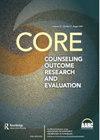两份心理咨询期刊关于社会阶层和社会经济地位的17年系统内容分析
引用次数: 4
摘要
摘要本研究对来自《咨询师教育与监督》和《咨询与价值》两种咨询期刊(N = 636)的文章进行了定性、系统的内容分析,以了解社会阶层和社会经济地位(SES)术语的使用和运作情况。通过PRISMA程序、电子文本数据挖掘和共识编码过程,我们发现存在大量的社会阶层和SES术语(N = 537);然而,术语的使用频率不高且存在问题,包括术语合并和术语误用。此外,在实证文章子样本中,我们发现有问题的社会阶层和社会地位术语使用和变量应用的比例很高(86.67%)。实证子样本中的变量应用问题与数据分析、数据收集、数据报告或术语操作化有关。基于研究结果,我们建议咨询研究者加强社会阶层和社会经济地位术语的使用和变量操作,并指出这种加强如何影响咨询教育研究和咨询实践。本文章由计算机程序翻译,如有差异,请以英文原文为准。
A 17-Year Systematic Content Analysis of Social Class and Socioeconomic Status in Two Counseling Journals
Abstract We conducted a qualitative, systematic content analysis of articles from 2 counseling journals (N = 636), Counselor Education and Supervision and Counseling and Values, to understand social class and socioeconomic status (SES) term usage and operationalization. Through PRISMA procedures, electronic text data mining, and consensual coding processes, we found a high number of social class and SES terms (N = 537) present; however, terms were used infrequently and problematically, including term conflation and term misuse. Additionally, we uncovered high rates of problematic social class and SES term use and variable application (86.67%) in the empirical article subsample. Variable application issues in the empirical subsample were related to data analysis, data collection, data reporting, or term operationalization. Based on the study findings, we offer recommendations to counseling researchers to strengthen their social class and SES terminology usage and variable operationalization and suggest how such strengthening has the capacity to affect counselor education research and counseling practice.
求助全文
通过发布文献求助,成功后即可免费获取论文全文。
去求助
来源期刊

Counseling Outcome Research and Evaluation
Psychology-Psychology (all)
CiteScore
4.50
自引率
0.00%
发文量
11
期刊介绍:
Counseling Outcome Research and Evaluation (CORE) provides counselor educators, researchers, educators, and other mental health practitioners with outcome research and program evaluation practices for work with individuals across the lifespan. It addresses topics such as: treatment efficacy, clinical diagnosis, program evaluation, research design, outcome measure reviews. This journal also serves to address ethical, legal, and cultural concerns in the assessment of dependent variables, implementation of clinical interventions, and outcome research. Manuscripts typically fall into one of the following categories: Counseling Outcome Research: Treatment efficacy and effectiveness of mental health, school, addictions, rehabilitation, family, and college counseling interventions across the lifespan as reported in clinical trials, single-case research designs, single-group designs, and multi- or mixed-method designs.
 求助内容:
求助内容: 应助结果提醒方式:
应助结果提醒方式:


